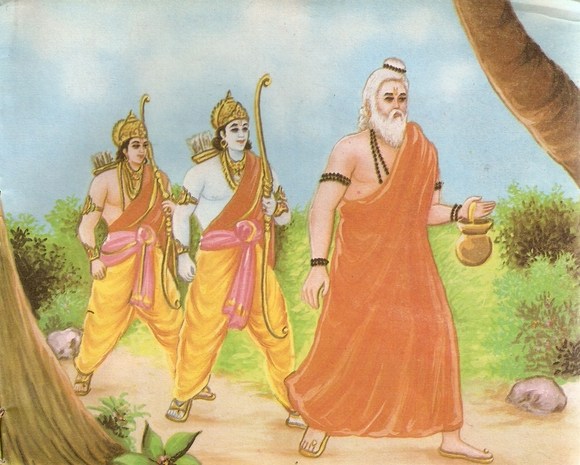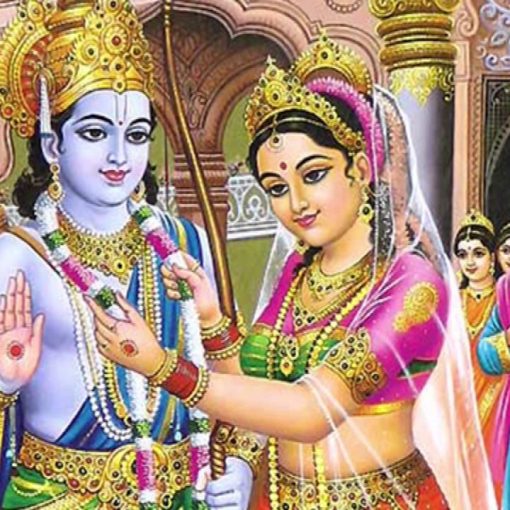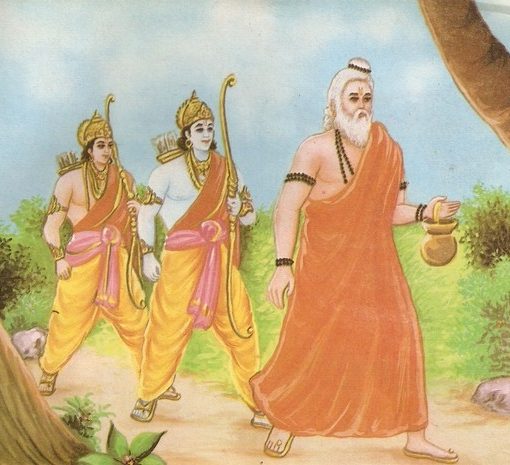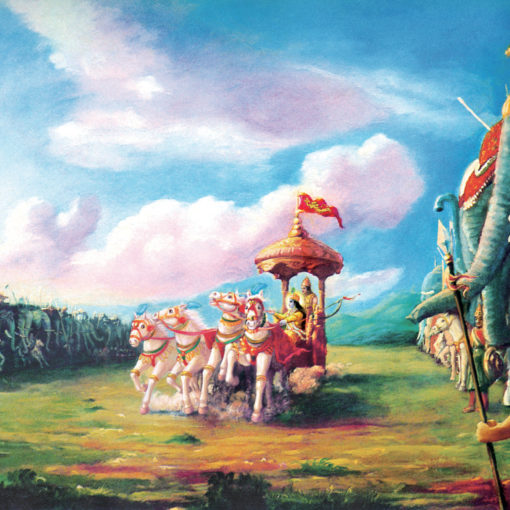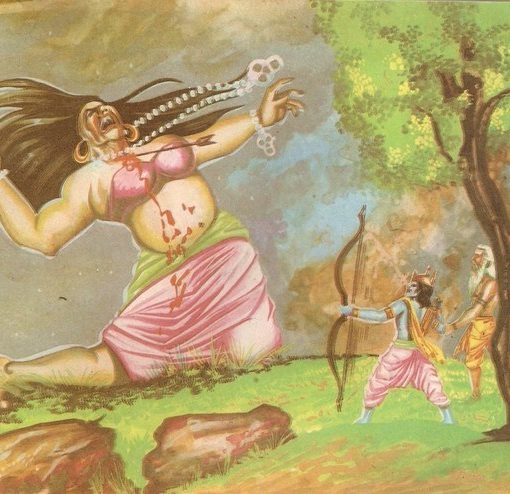The following morning they went towards the northeast, heading for Mithila. Gradually the forest paths gave way to roads laid with stone that led to the city. The forest opened to fields of crops. As they came closer to Mithila they saw well-planned gardens and groves with seats and fountains. The sounds of wild animals were replaced with the clamor of people in the city.
Shouts of children and the rumbling of horse-drawn chariots greeted them as they entered the gates of Mithila. Huge elephants swayed along majestically, with smiling people waving from the howdahs on their backs. Gazing about them, the travelers saw the golden domes of innumerable temples along with many mansions of brilliant white stone. Along the roadside were shops displaying countless varieties of fruits, vegetables and all kinds of sweetmeats. Other vendors displayed rows of shining gems looking like numbers of rainbows. Everyone called out respectful greetings as the party moved slowly past. As they went along the wide, smooth road they were met by the king’s ministers, who had already been informed of their arrival.
Headed by Viśvāmitra and the princes, the party was led along the main highway to Janaka’s palace. People thronged the sides of the road to gaze upon the famous sage and his two illustrious charges. As they looked upon the powerful princes, some of them guessed that they might be the sons of Emperor Daśaratha. The people wondered what had brought the princes to Mithila. Were they going to attempt to string the king’s great bow? As Rāma smiled at the people they were filled with a desire to see this handsome, powerful prince win Sītā’s hand.


Once the formalities were complete, a meal was offered to the sage and the princes. As they sat on the floor on silk rugs, ivory tables were placed in front of them. Gold and silver dishes were fetched containing choice foods of every description. They ate heartily and when they were finished, Janaka said to Viśvāmitra, “Great indeed is my good fortune today for I see before me your holy self. I am blessed by your presence. Tell me who are these two boys accompanying you? They appear like two powerful tigers and They rival the gods in beauty and grace. What brings you here to my house, along with these boys equipped with weapons?”
The king had waited until the travelers were rested and refreshed before making his inquiries. Viśvāmitra told him all about the boys and how They had disposed of the Rākṣasas in the forest. They had come now to see the famous bow. Janaka was thrilled to hear that They were princes from Ayodhya. Nothing could be better than an alliance with Daśaratha’s line. If only Rāma could pass the test of the bow.
At that point Satananda, Janaka’s head priest, spoke to the princes. After welcoming them he began to narrate the history of Viśvāmitra. Satananda was himself a great ascetic. He knew Viśvāmitra well, having previously spent time with him in his hermitage. Seeing the famous sage again, Satananda felt inspired by affection to speak of his glories. Looking upon the beautiful faces of Rāma and Lakṣman, who sat enraptured by his speech, the priest told the story of Viśvāmitra, who had performed difficult asceticism for thousands of years. [See Appendix Two, The History of Viśvāmitra.]
He told them how the sage had once been a great king and, after practicing tremendous austerities, had been blessed by Brahmā to become a powerful ṛṣi. When Satananda finished his astonishing tale, everyone gazed with awe at Viśvāmitra, who sat flanked by the princes, his mind absorbed in thoughts of the Supreme Lord. Janaka approached the effulgent ṛṣi and spoke to him with joined palms. “I stand blessed by your appearance, O holy sage. This account of your many glories has filled my mind with wonder. Indeed, I could go on hearing it again and again. But dusk has now fallen and I beg your leave. Let us meet again in the morning and it will be my very great delight to satisfy your every desire.”
Janaka, along with his ministers and priest, circumambulated Viśvāmitra in respect and then departed. After performing their evening rituals and prayers, Viśvāmitra and the princes rested for the night in the king’s palace.
Reference: Ramayana – Krishna Dharma Das

